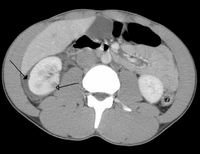
Peritoneal lavage cytology in the diagnosis of pelvic endometriosis
Sign Up to like & getrecommendations! Published in 2021 at "Diagnostic Cytopathology"
DOI: 10.1002/dc.24721
Abstract: We aimed to assess the sensibility, specificity, and predictive values of cytology of the fluid sediment in patients with pelvic endometriosis diagnosed based on laparoscopic‐guided biopsy. read more here.
Keywords: peritoneal lavage; lavage cytology; cytology diagnosis; pelvic endometriosis ... See more keywords

Peritoneal lavage with hydrogen-rich saline can be an effective and practical procedure for acute peritonitis
Sign Up to like & getrecommendations! Published in 2021 at "Surgery Today"
DOI: 10.1007/s00595-021-02271-z
Abstract: Acute peritonitis has remained a fatal disease despite of recent advances in care and treatment, including antibiotic and anticoagulant treatments. The cause of death is mostly sepsis-induced multiple organ failure. Oxidative stress can play an… read more here.
Keywords: procedure; acute peritonitis; peritoneal lavage; lavage hydrogen ... See more keywords

Extended intraoperative peritoneal lavage as prophylactic peritoneal recurrence for locally advanced gastric cancer: a prospective randomized trial
Sign Up to like & getrecommendations! Published in 2021 at "Clinical and Translational Oncology"
DOI: 10.1007/s12094-021-02596-8
Abstract: To demonstrate whether extensive intraoperative peritoneal lavage (EIPL) could yield better results in overall survival and less recurrence, regardless of peritoneal cytology, compared to standard peritoneal lavage (SPL). A prospective randomised multicenter study including 94… read more here.
Keywords: locally advanced; recurrence; cytology; peritoneal lavage ... See more keywords

A single-institution retrospective analysis of gastric carcinoma with positive peritoneal lavage cytology and without serosal invasion: A case series
Sign Up to like & getrecommendations! Published in 2019 at "Annals of Medicine and Surgery"
DOI: 10.1016/j.amsu.2019.01.003
Abstract: Background and objectives Peritoneal dissemination of gastric cancer is often associated with serosal infiltration. The aim of this study was to evaluate the clinical importance of peritoneal lavage cytology in patients with gastric carcinoma without… read more here.
Keywords: serosal invasion; gastric cancer; cytology; peritoneal lavage ... See more keywords

Novel approach to intraoperative peritoneal lavage with an extracorporeal stirring method in laparoscopic surgery for generalized peritonitis: Preliminary results
Sign Up to like & getrecommendations! Published in 2019 at "Asian Journal of Endoscopic Surgery"
DOI: 10.1111/ases.12685
Abstract: The primary concern with laparoscopic intraoperative peritoneal lavage (IOPL) for generalized peritonitis relates to the difficulty and uncertainty in ensuring adequate washout of contaminated fluid. Here, we describe a new method of laparoscopy‐assisted IOPL. read more here.
Keywords: intraoperative peritoneal; method; generalized peritonitis; peritoneal lavage ... See more keywords

Laparoscopic peritoneal lavage for perforated sigmoid diverticulitis – an example of surgical research failure
Sign Up to like & getrecommendations! Published in 2017 at "Colorectal Disease"
DOI: 10.1111/codi.13598
Abstract: We read with interest the paper for debate published by Afshar and Kurer [1]. Beyond the data of randomised trials (RCTs) discussed in the paper, we would add some elements for debate in the light… read more here.
Keywords: peritoneal lavage; perforated sigmoid; lavage perforated; laparoscopic peritoneal ... See more keywords

Prediction of peritoneal recurrences of gastric cancer by qPCR analysis of peritoneal lavage fluids.
Sign Up to like & getrecommendations! Published in 2019 at "Journal of Clinical Oncology"
DOI: 10.1200/jco.2019.37.4_suppl.52
Abstract: 52 Background: Peritoneal lavage cytology has been regarded as the only reliable method detect free cancer cells in the abdominal cavity. However, there certainly are patients who experience peritoneal recurrences despite negative cytology. Methods: Using… read more here.
Keywords: lavage fluids; cytology; peritoneal recurrences; lavage ... See more keywords

Extensive peritoneal lavage after curative gastrectomy for gastric cancer study (EXPEL): An international multicenter randomized controlled trial.
Sign Up to like & getrecommendations! Published in 2020 at "Journal of Clinical Oncology"
DOI: 10.1200/jco.2020.38.4_suppl.279
Abstract: 279Background: Peritoneal recurrence of gastric cancer after curative surgical resection is common and portends a poor prognosis. Preliminary studies suggest extensive intraoperative peritoneal lav... read more here.
Keywords: extensive peritoneal; lavage curative; peritoneal lavage; gastric cancer ... See more keywords

ASO Author Reflections: Real Prevalence of Occult Cancer Cells in Peritoneal Lavage in Patients with Pancreatic Ductal Adenocarcinoma
Sign Up to like & getrecommendations! Published in 2020 at "Annals of Surgical Oncology"
DOI: 10.1245/s10434-020-09038-9
Abstract: Peritoneal recurrence is one of the major causes of impaired prognosis and accounts for approximately 30% of initial relapse patterns in patients with pancreatic ductal adenocarcinoma (PDAC). Peritoneal lavage cytology (CY) has been widely used… read more here.
Keywords: peritoneal lavage; cells peritoneal; patients pancreatic; lavage ... See more keywords

Postoperative Treatment of Resectable Pancreatic Cancer With Positive Peritoneal Lavage Cytology: A Multicentre Retrospective Study
Sign Up to like & getrecommendations! Published in 2022 at "AntiCancer Research"
DOI: 10.21873/anticanres.15547
Abstract: Background/Aim: We aimed to evaluate pancreatic cancer (PC) with positive peritoneal lavage cytology (CY1) outcomes following a change in adjuvant therapy. Patients and Methods: The clinicopathological data of patients with pancreatic adenocarcinoma with CY1 at… read more here.
Keywords: peritoneal lavage; cancer positive; pancreatic cancer; cytology ... See more keywords

Tumor DNA in Peritoneal Lavage as a Novel Biomarker for Predicting Peritoneal Recurrence in Patients With Gastric Cancer
Sign Up to like & getrecommendations! Published in 2023 at "AntiCancer Research"
DOI: 10.21873/anticanres.16367
Abstract: Background: Peritoneal lavage cytology positivity (CY1) has been identified as a prognostic factor for distant metastases that is equivalent to peritoneal dissemination in Japan. Peritoneal lavage cytology is usually diagnosed by microscopic findings; a diagnostic… read more here.
Keywords: peritoneal lavage; dna; patients gastric; group ... See more keywords